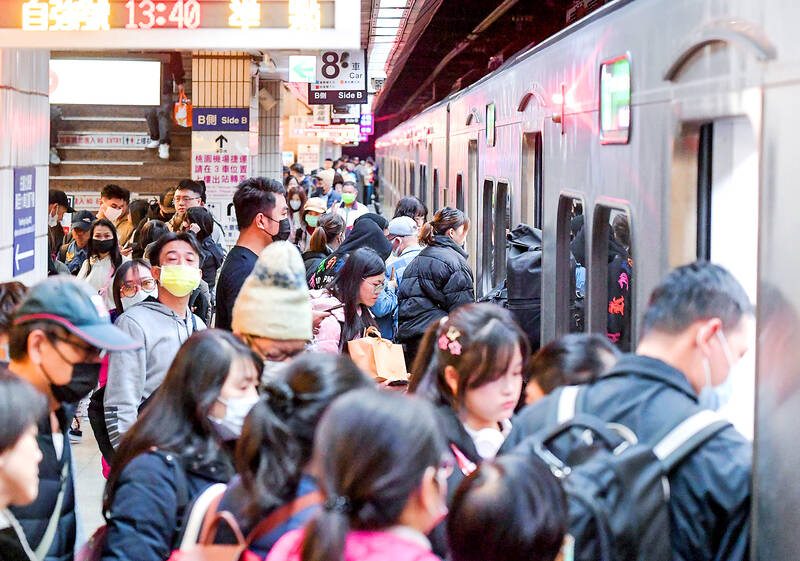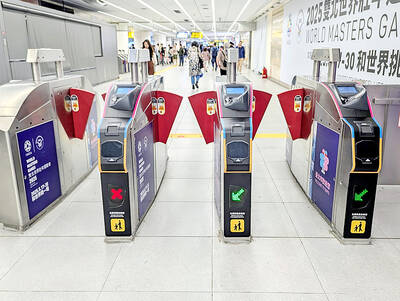As many people are traveling over the Lunar New Year holiday or school winter break, the National Health Insurance Administration (NHIA) is reminding the public of its medical treatment services for those planning trips.
Those in need of hospitals, clinics or pharmacies that are open during the Lunar New Year holiday can check the NHIA’s Web site (www.nhi.gov.tw) or download the National Health Insurance (NHI) express app (全民健保行動快易通), the agency said.
Web site users can click on “NHI service” (健保服務), then “NHI healthcare services” (健保醫療服務) and “hospital search” (院所查詢) to find the opening hours of NHI-contracted hospitals, clinics or pharmacies, the agency said.

Photo: Wang Wen-lin, Taipei Times
On the mobile app, users can click “medical query” (醫療查詢) and “hospital search” (就醫院所查詢) to find their nearest NHI-contracted healthcare facilities or pharmacies on a map, along with their information and opening hours.
People who do not have access to the Internet can call the NHIA’s all-hours toll-free hotline at 0800-030-598, the agency said.
If people require medical treatment, but have forgotten to bring their NHI card or have lost it while traveling domestically, they can fill in an “exceptional access to medical care form” at hospitals and clinics after showing their identification card, NHIA Director-General Shih Chung-liang (石崇良) said.
The agency has urged NHI-contracted healthcare facilities to cooperate in implementing the measure during the Lunar New Year holiday to protect people’s right to medical care, he said.
People should beware of phone or text scams claiming to be from the agency, as the NHIA does not inform people about overdue NHI payments, the illegal use of NHI cards or blocked NHI cards through phone calls, voice messages, text messages or social media, the agency said.
It also does not ask people to call it back, click on links, provide personal information or transfer money through these methods, the NHIA said, adding that some of the links provided by scammers lead to phishing Web sites aimed at stealing people’s names, passwords, banking details or other sensitive information.
If people receive a suspicious phone call, voicemail or text message, they should not follow the instructions and report the incident to the police’s 165 anti-fraud hotline, or call the NHIA’s toll-free hotline, or (02)4128-678 when using a cellphone, between 9am and 5pm through Wednesday.
If people covered by the NHI have an emergency illness or childbirth, or are injured when traveling abroad, and require medical care, they can apply for reimbursement six months from the day they received the outpatient care or emergency treatment or from the day they were discharged, the agency said.
However, under the Regulations for National Health Insurance Reimbursement of the Self-advanced Medical Expenses (全民健康保險自墊醫療費用核退辦法), the injuries or illnesses must require emergency treatment to be covered, so seeking medical treatment for a mild cold or a planned overseas childbirth would not be included.
The most common emergency injuries and illnesses sustained and treated overseas in 2018 were acute upper respiratory tract infections, renal failure, acute bronchitis, dental problems and tonsillitis, NHIA data showed.
Those who want to apply for remuneration should submit an NHI reimbursement application form (downloadable on the agency’s Web site), the original medical expense receipt and itemized list of expenses, the diagnosis certificate, the hospitalization documents along with a discharge summary, a copy of their passport and proof that they exited and re-entered Taiwan.
For applicants who were hospitalized in China for five days or more (excluding the day of discharge), the original medical expense receipt and diagnosis certificate must be notarized by a notary public in China and verified by the Straits Exchange Foundation after returning to Taiwan.
The documents could be mailed or delivered personally to one of the NHIA’s six regional branches for submission.
However, there is a review process for the reimbursement of overseas medical expenses, which might not be fully covered, as the maximum amount that can be reimbursed is the average cost of visits to NHI-contracted hospitals and clinics the previous season.
The maximum reimbursement limit for this season — from January to March — is NT$1,024 for an outpatient visit, NT$3,298 for an emergency room visit and NT$6,227 per day for hospitalization, the NHIA said.
The agency said it strongly advises travelers to purchase medical insurance for international travel to ensure better coverage in case of a medical emergency.
Jeng Cherng-jye (鄭丞傑), a professor of obstetrics and gynecology at Kaohsiung Medical University, in July last year wrote on Facebook about an accident he had while skiing in Alaska the previous month.
He wrote that he was taken to the largest hospital in town and stayed in the emergency room for more than six hours, receiving basic blood and urine tests, a computerized tomography scan that showed two rib fractures and an injection for pain relief.
He said he received a medical bill of about NT$520,000, which was later discounted to about NT$415,000.
“It was really shocking,” he wrote, saying that he only talked to the doctor for about six minutes and stayed in the emergency room getting the exams and waiting for about six hours, but it cost about 100 times what it would have in Taiwan.
“The NT$415,000 in medical expenses must be paid out of pocket in advance ... but based on the average cost of an emergency room visit in Taiwan, I do not even know if I can receive NT$4,150 — 1 percent of the bill,” Jeng wrote. “It is fortunate that I purchased accident insurance.”
“Taiwanese are blessed to have an NHI system that the rest of the world envies, so we should cherish it and not abuse it or waste its resources,” he wrote.

A magnitude 6.4 earthquake struck off the coast of Hualien County in eastern Taiwan at 7pm yesterday, the Central Weather Administration (CWA) said. The epicenter of the temblor was at sea, about 69.9km south of Hualien County Hall, at a depth of 30.9km, it said. There were no immediate reports of damage resulting from the quake. The earthquake’s intensity, which gauges the actual effect of a temblor, was highest in Taitung County’s Changbin Township (長濱), where it measured 5 on Taiwan’s seven-tier intensity scale. The quake also measured an intensity of 4 in Hualien, Nantou, Chiayi, Yunlin, Changhua and Miaoli counties, as well as

Credit departments of farmers’ and fishers’ associations blocked a total of more than NT$180 million (US$6.01 million) from being lost to scams last year, National Police Agency (NPA) data showed. The Agricultural Finance Agency (AFA) said last week that staff of farmers’ and fishers’ associations’ credit departments are required to implement fraud prevention measures when they serve clients at the counter. They would ask clients about personal financial management activities whenever they suspect there might be a fraud situation, and would immediately report the incident to local authorities, which would send police officers to the site to help, it said. NPA data showed

ENERGY RESILIENCE: Although Alaska is open for investments, Taiwan is sourcing its gas from the Middle East, and the sea routes carry risks, Ho Cheng-hui said US government officials’ high-profile reception of a Taiwanese representative at the Alaska Sustainable Energy Conference indicated the emergence of an Indo-Pacific energy resilience alliance, an academic said. Presidential Office Secretary-General Pan Men-an (潘孟安) attended the conference in Alaska on Thursday last week at the invitation of the US government. Pan visited oil and gas facilities with senior US officials, including US Secretary of the Interior Doug Burgum, US Secretary of Energy Chris Wright, Alaska Governor Mike Dunleavy and US Senator Daniel Sullivan. Pan attending the conference on behalf of President William Lai (賴清德) shows a significant elevation in diplomatic representation,

The Taipei MRT is to begin accepting mobile payment services in the fall, Taipei Rapid Transit Corp said on Saturday. When the company finishes the installation of new payment units at ticketing gates in October, MRT passengers can use credit cards, Apple Pay, Google Pay and Samsung Pay, the operator said. In addition, the MRT would also provide QR payment codes — which would be compatible with Line Pay, Jkopay, iPass Money, PXPay Plus, EasyWallet, iCash Pay, Taiwan Pay and Taishin Pay — to access the railway system. Currently, passengers can access the Taipei MRT by buying a single-journey token or using EasyCard,